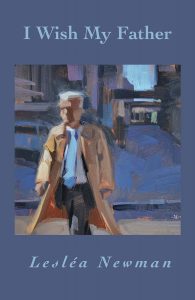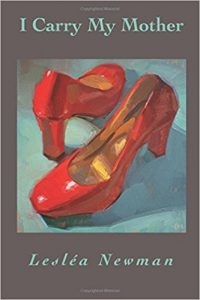Headmistress Press, 2021
 Buy a Signed Copy
Buy a Signed Copy
For every book ordered directly from Lesléa Newman, she will donate $1 to Bright Spot Therapy Dogs. Order through PayPal below, or, if you prefer to pay by check or money order, send an email to [email protected] and she will provide address and instructions. Books will be sent out mid-January.
Or purchase from other sellers:
Book Trailer
Also available:

I Carry My Mother
About This Book
I Wish My Father, a companion book to I Carry My Mother, begins with the death of Lesléa Newman’s mother, which separates her parents, and ends with her father’s death, which reunites them in the world to come. The five years that her father outlived her mother were full of sorrow, frustration, anger, and sometimes even joy. “I learned so much about my dad and my mom and their 63-year-old marriage. And I learned a great deal about myself as I took on the role of caretaking a proud, stubborn Jewish man who refused to accept that his world and his role in it were rapidly changing as he was forced to go from husband to widow, attorney to retiree, tennis player to spectator, driver to passenger, and homeowner to independent living resident.”
Excerpts
The People Next Door
fight every night,” says my father,
his raspy voice rising on the phone.
“They yell, they scream, they
carry on, you bitch, you bastard.
They slap each other, they punch
each other, they kick each other
he’s beating me, she’s beating me
night after night after night.
I’m telling you, no one can do
anything, even the cops can’t make them
stop. I don’t know how they allow it.
I haven’t had a decent night’s
sleep since I moved in here.
I’ve never heard anything like it.
I swear I’m losing my mind.”
“Dad, I’m very sorry to hear this,” I say.
“Dad, that sounds very unpleasant,” I say.
“Dad, don’t worry, I’ll speak to them,” I say
because I am the daughter
who takes care of everything.
I am the daughter
who fixes everything.
I am the daughter who doesn’t
have the heart
to tell her disturbed
and disturbing father
there are no people next door.
Copyright ©2020 by Lesléa Newman
Also read:
Three Poems from I Wish My Father
“The First Time We Visit”
Honorable Mention, 2020 Robinson Jeffers Tor House Prize for Poetry
Reviews
“Newman’s poems allow the reader to take part in these father-daughter conversations, a moving reflection on grief and love.”
“This book is both an extraordinary tribute and a consoling mirror, reflecting our own loves and our own losses. Newman’s I Wish My Father is a big-hearted masterpiece that has my whole-hearted recommendation.”
“Many of you may know Lesléa Newman as an author of children’s books and not as a poet. If that is the case, you have missed some of her best writing. Pick up this book and its companion, I Carry My Mother, and sit back and enjoy the profundity of her wonderful poetry.”
“These are not easy or comfortable poems, especially for those of us who are caring for or have lost our own parents, but they are powerful in capturing what so many of us go through. They may offer the solace of showing us that we are not alone in our feelings of loss, frustration, grief, reminiscence, and love.”
“Shepherding an elderly parent through illness and death is a stark, unglamorous journey that demands clear vision and directness, and (especially if you’re a Jewish New Yorker) a fair amount of gallows humor. These qualities abound in Lesléa Newman’s latest poetry collection, I Wish My Father.”
“Through these poems, the author portrays a loving relationship with a father who is in decline. In the process, we also gain glimpses of her mother who shared more than sixty years of life with her father. The narratives are strong in their revelations of the father’s character, his relationship with his work, his family, his habits, and his encroaching senility.”
“My intention was to ‘peek’ at I Wish My Father, but I couldn’t put it down, and after the last poem, I started again from page one and read to the end. This collection is so moving and plain-spoken, that the careful attention to the ingredients of sound and prosody baked into each line might go unnoticed, which is what we, as poets, hope for. I got to know the author’s dad in all his humanity; he is now part of my family. A wonderful companion to I Carry My Mother; in both volumes, Newman captures the moods and personalities beautifully.”
“This collection speaks eloquently to the dictum that if you write fully about one person, you write about all people in their humanity. Lesléa Newman deftly enumerates situations that in their beautifully observed wrinkles and folds give forth the feeling of an aged man’s life and his relationship with his daughter, who, in dealing with his crotchets and quibbles, to saying nothing of pure stubbornness, is “on the edge / of a nervous breakdown.” Droll and sad, these poems possess an abundance of insight, a precious empathy that rises out of the depths of exasperation into the bemused heights of love.”
“I Wish My Father is a study of a father-daughter relationship, full of daily expressions of love, loyalty, and devotion that passes between the two. In this book-length verse sequence, a partner to Newman’s previous collection I Carry My Mother, the poet bears witness to her father’s life, post losing his wife/her mother, and brings forth their shared grief in finely wrought observations of domestic moments that resound with larger meaning. With Newman’s trademark clarity of language and her matter-of-fact tone mixed with tenderness, these poems offer moving reflections on facing the vicissitudes of aging, loss, and mortality.”
“What poetry teaches us most importantly is how to be human: its purpose is ontological; its affect, sacramental. Lesléa Newman’s I Wish My Father is comprised of narrative poems about her father in the last years of his life, and retrospectively, throughout his ninety-plus years. Her wisely distilled and carefully rendered details are paired with his habits of speech so they succeed in embodying his way of being in the world. We see this man in relation to those he loved, those he served, those he interacted with from the casually flirtatious to profoundly and grandly loving, and we learn how he comported himself as a person. And while these poems are personal, they are transpersonal as well: an entire world, a time, a place, a culture . . . came into this world and has left it. How to express the meaning of all that? Newman’s poems succeed in making the best possible approximation: With precision, compression, a graceful style earned through a lifetime of writing, paired with Newman’s tender and compassionate gaze, we are given the true good, the enduring image of the person kept beyond time, love’s greatest blessing. There is so much more than delight and recognition encountered in reading the poems in this collection. They comprise an act of honoring that witnessed, enriches the reader, and that honors, by the very fact of their being, the reader’s experience. Who could ask more of a work of art?”